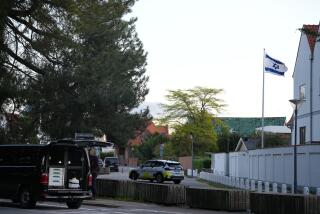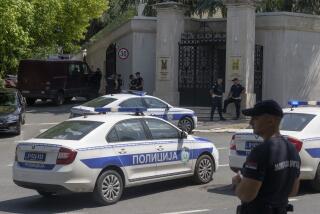Turkish Embassy Bombed in Beirut; No One Is Hurt
BEIRUT — A bomb exploded early Friday outside the Turkish Embassy in Lebanon, causing damage but no injuries, security sources said.
They said the nighttime blast shattered windows in the building and set ablaze two cars parked opposite the embassy, located in the Baabda area in the hills above East Beirut.
The explosion brought to 13 the number of attacks in Lebanon on embassies, banks or establishments of countries associated with the U.S.-led coalition at war with Iraq.
No group claimed responsibility for Friday’s attack. However, Palestinian and Lebanese groups sympathetic to Baghdad have vowed vengeance attacks against Iraq’s enemies.
Turkey is allowing U.S. planes to launch air attacks against northern Iraq from the Incirlik base in southern Turkey.
In other attacks possibly related to the Gulf War:
Unidentified assailants from a slow-moving automobile Friday threw a stick of dynamite at the main branch of the British Bank of the Middle East in downtown Amman, Jordan. The dynamite shattered glass but caused no injuries, witnesses said.
There was no immediate claim of responsibility for the bombing, which took place on the Muslim Sabbath. Britain is allied against Iraq.
The U.S. Embassy in Lima, Peru, was struck by mortar fire late Thursday, causing severe structural damage but no injuries, police said.
A police spokesman said five mortar rounds were launched from a park in front of the embassy by young men who fled in a car that was waiting for them nearby.
No group has yet claimed responsibility for the latest attack, authorities said.
But a guerrilla group claimed responsibility for a similar attack on the embassy made Jan. 25, saying it was made in support of Iraqi leader Saddam Hussein.
In northern France, a fire, probably started deliberately, damaged a mosque early Friday, firefighters said.
The prayer room of the mosque in the small town of Montigny-en-Ostrevent, 130 miles north of Paris, was severely damaged.
France’s 5-million-strong Muslim community has said it fears increased racist attacks because of the war. Several shops run by Arabs have closed, and some Arabs have returned to their North African homelands.
Firefighters said the mosque, in a converted house, was the target of an arsonist a year ago.
More to Read
Sign up for Essential California
The most important California stories and recommendations in your inbox every morning.
You may occasionally receive promotional content from the Los Angeles Times.










